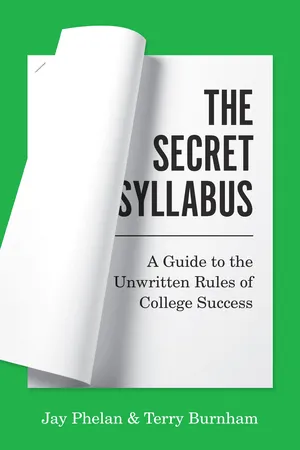
Skills for Scholars
A Guide to the Unwritten Rules of College Success
- 248 pages
- English
- ePUB (mobile friendly)
- Available on iOS & Android
About This Book
The unwritten rules of success that every student must follow to thrive in college The Secret Syllabus equips students with the tools they need to succeed, revealing the unwritten rules and cultural norms and expectations not included in the official curriculum. Left to figure out on their own how the academic world works, students frequently stumble, underperform, and miss opportunities. Without mastery of the secret syllabus, too many miss out on the full, rich experience available to them in college.Jay Phelan and Terry Burnham share the essential lessons they have learned from struggling, unfocused students as well as award-winning college instructors and researchers. The Secret Syllabus draws on Phelan and Burnham's experiences with thousands of undergraduate and graduate students. Weaving engaging storytelling with practical, actionable advice, they illustrate both productive and counterproductive approaches to achieving academic excellence, and highlight the importance of setting and attaining goals, nurturing strong relationships, developing resiliency, and more.This fresh, funny, and boldly innovative book enables students to develop the consistently winning and effective behaviors that will equip them to thrive on campus and beyond.
Frequently asked questions
Information
1
THE BIG PICTURE
Dear Professor Burnham, I am applying to graduate school and I would appreciate if you would write a recommendation letter on my behalf. Sincerely, your former student.
I was not a good student. Almost from the day I arrived at college (as a first-generation college student), things went poorly for me. My courses didn’t speak to me. It felt as though my instructors weren’t telling me anything about my life. My textbooks seemed out of touch with my own personal experiences in the world. And consequently, little of my course work felt relevant to me. I wanted to check out. Not surprisingly, my resulting “strategy” of poor attendance led to some very bad outcomes.This wasn’t simply a brief, difficult transition to college. I spent years stumbling into and out of “academic probation” and the more dire “subject to dismissal.” I was an interdisciplinary disappointment and received the dreaded grade of F repeatedly.I understand what it is like to sit in class and feel that all hope is lost. But I also have learned how to turn things around.
I never saw a clear and obvious path when I set off for college. Initially, I was pre-med because my father wanted me to be a doctor. After getting accepted to medical school, however, I decided to instead try to find my own path.I was a computer programmer, a tank driver in the U.S. Marine Corps Reserves, and worked on Wall Street for Goldman, Sachs & Co., before earning an MBA, a PhD, and then becoming a professor. My path was unnecessarily circuitous because of my lack of focus and guidance.Uncertainty about my direction also led me to take time off from college. I lived in Salt Lake City, where I skied and worked at a variety of jobs, including as a busboy and a short-order cook. Only after taking a day labor job at a slaughterhouse and standing waist-deep among bloody carcasses did I have the epiphany that maybe college wasn’t so bad.
Advice Is Not Enough
“You should go to office hours.” This is true, but it’s not very helpful. Because once you’re there, what should you do? Here’s a hint: asking your instructor to re-explain concepts from class is not among the most valuable reasons to go to office hours.“You should get some research experience.” “You should get some real-world experience, like an internship.” “You should get a faculty mentor.” “You should be more efficient when you study.” Again, these are true. But they miss the mark. As is often the case, the more important guidance you need is about how you actually do those things. We will help you succeed with all of these.
“The sooner you have a major, the better a candidate you will be for jobs, for transfer to a better school, or for graduate schools.” Not only is this advice not helpful, in a very large number of cases, it is completely wrong.
“Get to class early.”“Be prepared. Read the assigned material.”“Try not to cram for tests.”“Avoid procrastination.”
The Secret Syllabus
- craft your college experience;
- develop professional relationships;
- achieve academic excellence;
- increase your resiliency; and
- plan your postcollege career.
Table of contents
- Cover
- Praise for The Secret Syllabus
- Series Page
- Title Page
- Copyright
- Contents
- Preface
- 1. The Big Picture: Every Culture Has Rules and Norms. Some Are Written, But Many Are Not
- Setting Goals: It’s Not the Plan, But the Planning
- Achieving Goals: How to Interact Effectively and Get Stuff That You Need
- The Nuts and Bolts of Learning and Performing
- Overcoming Barriers to Success
- Career Planning
- Conclusion
- Acknowledgments
- Appendix
- Index